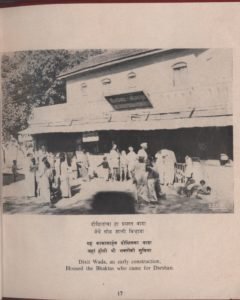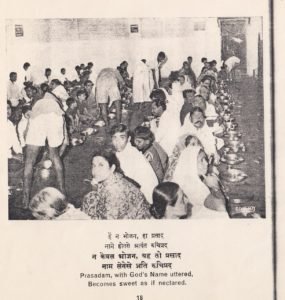Living beings need food to grow, sustain and continue the progeny. The food we eat contains the nutrients that our body needs to replace the cells stay healthy, strong. Hunger is the common problem across all living beings. Without food life cannot sustain itself. Sai Baba used to say ” God is not attained on an empty stomach; first the soul has to be appeased. In short, when all organs get their proper nutrition and are sound, we can practice devotion and other sadhanas to attain God.” He also said, “Food alone is the means of sustaining life and after death it is in the food that it merges.”
If we offer anything in charity, there is a human tendency to want more, for example if one offers money as Charity no one is satisfied with the amount received. So, the best charity is giving food, we can give food to all living beings, there is no discrimination. No living being can consume more than what is needed, they are satisfied once their hunger is satiated. The most common forms of giving is the sharing of food with others. Every religion says it is a religious duty (dharma) to offer food to any unexpected guest.
No pooja or religious function is complete in Indian culture without offering of prasad or food. Food plays an important role in worship, and the food offered to the deities (prasad) is thought to bestow considerable religious merit, purifying body, mind and spirit. Further in Indian tradition a householder is expected to partake of food only after it has been reverentially offered to the deities, the ancestors, the mendicant, and those dependent on him. The practice of offering of food is common to all sections of Indian society and continues to be an important aspect of people’s way of life. On religious and other important occasions anna dana is undertaken on a large scale.
Many religious organisations have regular kitchens which cook food both for the presiding deity and the pilgrims and they are feeding throughout the day for example, Shirdi Sai Sansthan, Tirumala Tirupathi Devastham, Gurudwaras.
As Sai Baba is a practical god, He laid lot of emphasis on serving of food to all living beings, Chapter 38 of Sai Satcharitra says
Verse 12: For every yuga respectively, the Dharmashastra has prescribed proven means to attain Moksha, as for Satyayuga penance, for Treta Yuga the attainment of knowledge, for Dwapara yuga yagna or sacrifice and for Kali yuga Charity.
 Verse 13: One should keep giving, all the time, in charity, but main significance lies in the appeasement of hunger. Hence Annadanna or feeding in charity regularly is the chief among all actions.
Verse 13: One should keep giving, all the time, in charity, but main significance lies in the appeasement of hunger. Hence Annadanna or feeding in charity regularly is the chief among all actions.
Verse 16: Food is just another form of Parabrahma and all the living creatures are born out of it. Food alone is the means of sustaining life and after death it is in the food that it merges.
Verse 18: When giving wealth, clothes, vessels, etc it is to be considered whether the receiver is deserving or not. But for Annadaan, no such consideration is needed. Whoever comes to the door and at whatever time, it is not proper to show disrespect to him
Sai Baba’s Handi as described in Chapter 38 of Sai Satcharitra:
Giving food is the best of all the charities; we are much perturbed when we get no food when hungry. Other beings feel similarly under similar circumstances. The one who gives food to the poor and hungry is the best donor or charitable person. When anybody comes to our door at noon uninvited, it is our duty to welcome him by giving food. If lame, crippled, blind diseased paupers come, they should be fed first and the able-bodied persons and our relations afterwards. The merit of feeding food to the former is much more than the latter.
It was stated that Sai Baba required very little food for Himself and obtained it through begging from a few houses. Baba Himself never ate anything without sharing it with others. Everyday He used to go out begging and whatever food was collected. He used to place it in the earthen bowl in the Masjid. Some beggars used to pinch 3-4 breads and dogs and birds used to eat out of it; but Baba never drove them away. Whenever any devotee offered Him fruits and richly cooked food, He hardly tasted it and distributed amongst the devotees present
He not only distributed the food he begged but also cooked and fed all sumptuously. He made all the necessary preparations HIMSELF and depended on none. To see whether the food was properly cooked or not, Sai Baba rolled up the sleeve of His kafni and put His bare arm in the boiling cauldron without the least fear and churned the whole mass from side to side and up and down. There was no mark of burn on His arm or fear on His face. When the cooking was over, Baba got the pots in the masjid and had them duly consecrated by the mouli. Firstly, He sent part of the food as prasad to Mhalsapathy and Tatya Patil and then He would serve the remaining contents with His own hand to all the poor and helpless people to their hearts content. Really blessed and fortunate must be those people who got food prepared by BABA and served by HIM.
Sai Baba continued to cook food in the handi till about 1910. Thereafter due to the spread of fame of Sai Baba, the influx of devotee’s increased and considerable naivedya was offered to Shri Sai. It was so much in excess that it used to suffice for all the people of Shirdi. Sai Baba served both vegetarian and non-vegetarian food. He never created in the devotees any wish or desire to indulge in this food. There is a principle well established that when a Guru Himself gives anything as Prasad, the disciple who thinks and doubts whether it is acceptable or not goes to perdition.
Baba’s Nectar like words to Nana Chandorkar with respect to Athithis (Guests)
“An athithi is not necessarily a person who is a Brahmin by birth and who would come to your quarters to sit at a meal with you. After, your puja is over, take some food out in your hand and leave it in some corner, and thousands of athithis (guests) will come one after another, each in due course and partake of it. They are the dogs, cats, flies, ants etc. To you they would not look like atithis. But they are athithis, for God is in them all. If you follow this the Vedic injuction is satisfied and you will obtain the required punya (merit)
– From Life of Sai Baba by H.H.Narasimha Swamiji.
Not to Disregard Offers of Food
 Sai Baba advised that while going out for some job, if it is meal time, do not go out on empty stomach, disregarding any offer of food. On the contrary, it should be regarded as auspicious sign of success. Moreover, there is also a strong reason for this. To do any job perfectly, one requires energy, which can only be acquired by eating food. Secondly, refusing something offered by somebody lovingly, means hurting that person’s feelings, which is certainly not a proper mood, while going out for an important task. In Chapter 32, Sai Baba has narrated His own experience as to how He and His companions lost their way in the woods because they disregarded the Vanjari’s offer of food and guidance. However, later, when Sai Baba accepted the Vanjari’s food and guidance, He was able to carry out the quest successfully. Similarly, in Chapter 33, Appasaheb Kulkarni was not able to find the Fakir, when he rushed out of home in hurry without his meals. However, later when after taking his meals, he strolled out with his friend, the Fakir Himself was seen approaching him and demanding dakshina.
Sai Baba advised that while going out for some job, if it is meal time, do not go out on empty stomach, disregarding any offer of food. On the contrary, it should be regarded as auspicious sign of success. Moreover, there is also a strong reason for this. To do any job perfectly, one requires energy, which can only be acquired by eating food. Secondly, refusing something offered by somebody lovingly, means hurting that person’s feelings, which is certainly not a proper mood, while going out for an important task. In Chapter 32, Sai Baba has narrated His own experience as to how He and His companions lost their way in the woods because they disregarded the Vanjari’s offer of food and guidance. However, later, when Sai Baba accepted the Vanjari’s food and guidance, He was able to carry out the quest successfully. Similarly, in Chapter 33, Appasaheb Kulkarni was not able to find the Fakir, when he rushed out of home in hurry without his meals. However, later when after taking his meals, he strolled out with his friend, the Fakir Himself was seen approaching him and demanding dakshina.
Never Eat Anything Without Sharing it with Others
In Chapter 24, Sai Baba has conveyed this principle very effectively by making fun of Annasaheb Dabholkar, the author of Shri Sai Satcharita, when some grains of gram were seen stuck in the folds of his coat’s sleeve. Sai Baba further explained that, when no person or animal is present nearly, one should offer it to Baba by remembering Him. This will result in the devotee avoiding food, which is impure and not fit to be enjoyed. He further explained that this method should be employed not in case of the sense of taste only but in case of all senses viz. sight,” touch etc. also.
In Chapter 9, Sai Baba expressed His great pleasure, when Mrs. Tarkhad fed a hungry dog during her meal lime. He further said,
“Ever act like this and this will stand you in good stead. First give bread to the hungry and then eat yourself!”. Similarly, we know, what Baba said to Laxmibai Shinde, who was annoyed because Baba gave the bread and vegetable, cooked urgently for Baba, to a nearby dog,
“Why do you grieve for nothing? The appeasement of the dog’s hunger is the same as Mine. Though some speak and others are dumb, the hunger of all creatures is the same. Know for certain that he who feeds the hungry, really serves Me with food.” (Chapter. 42)
On the whole Shri Sai Baba Himself set an example of on the importance of Food and Annadana to all those present. By doing so, He has underlined the importance of Food and Annadana Service. The Shirdi Sansthan has got a separate fund for this purpose and from it only Annadan is done. On many festival days, the Annadan is free. We Sai devotees should also perform Annadan to poor, disabled, old people and also animals from our daily food to our best ability and follow the tradition of Shri Sai Baba.
By Sandhya Udtha

Sri Sai stories in this form are very useful and handy for daily reading. Efforts are commendable.